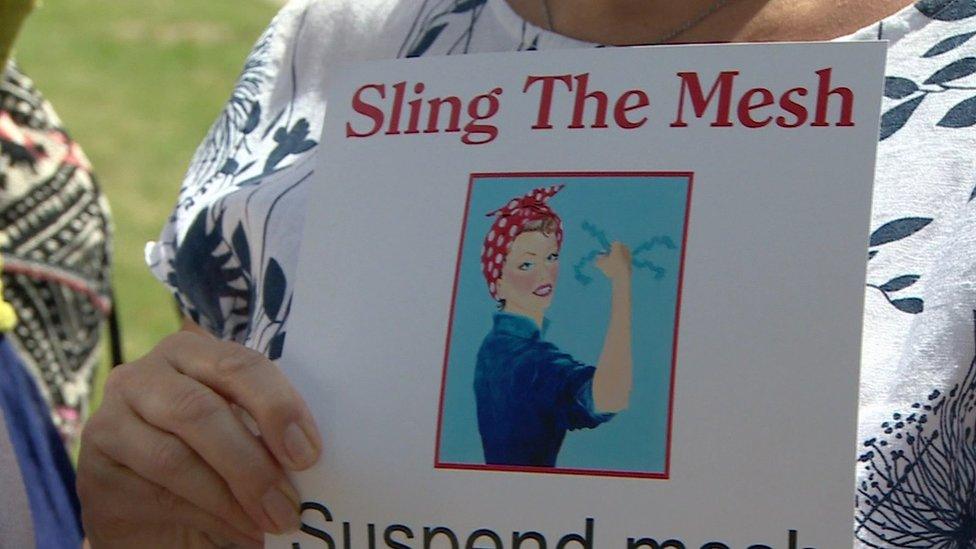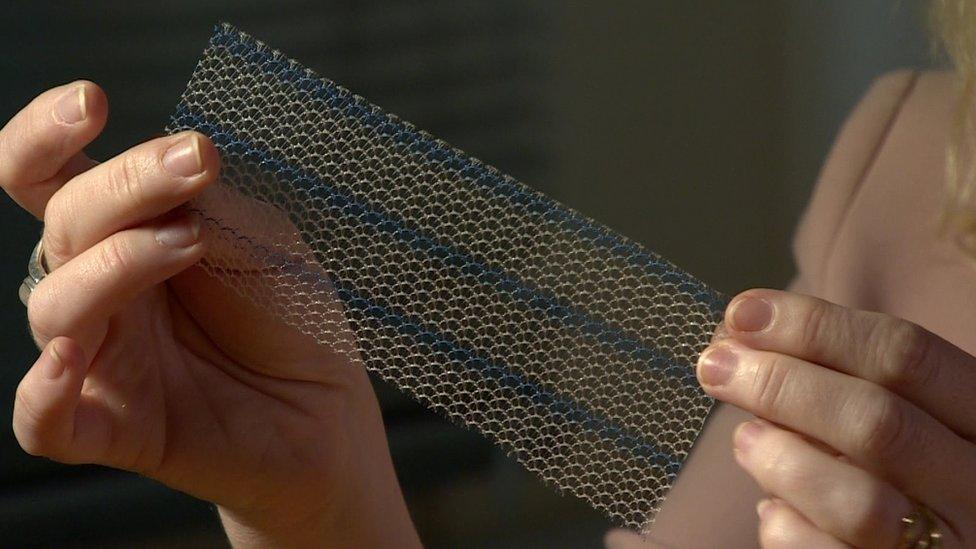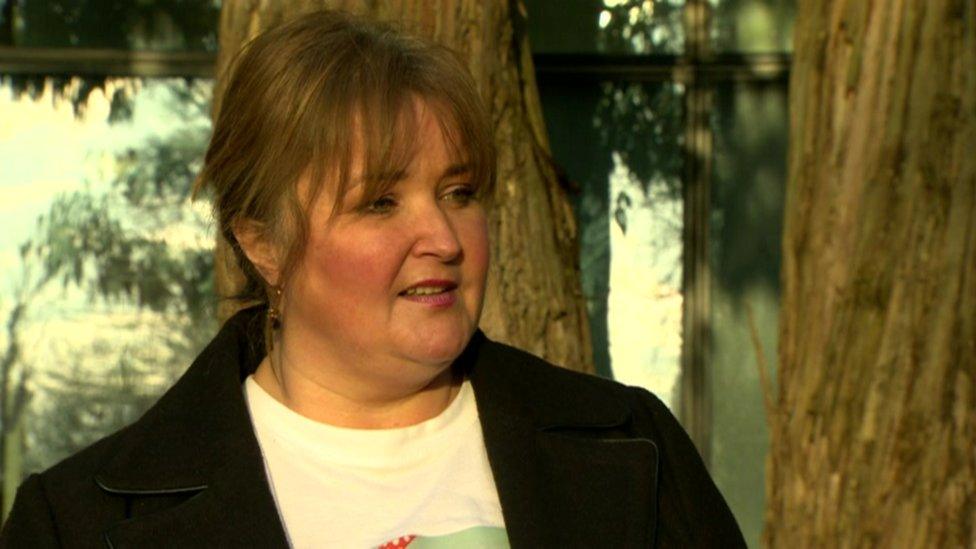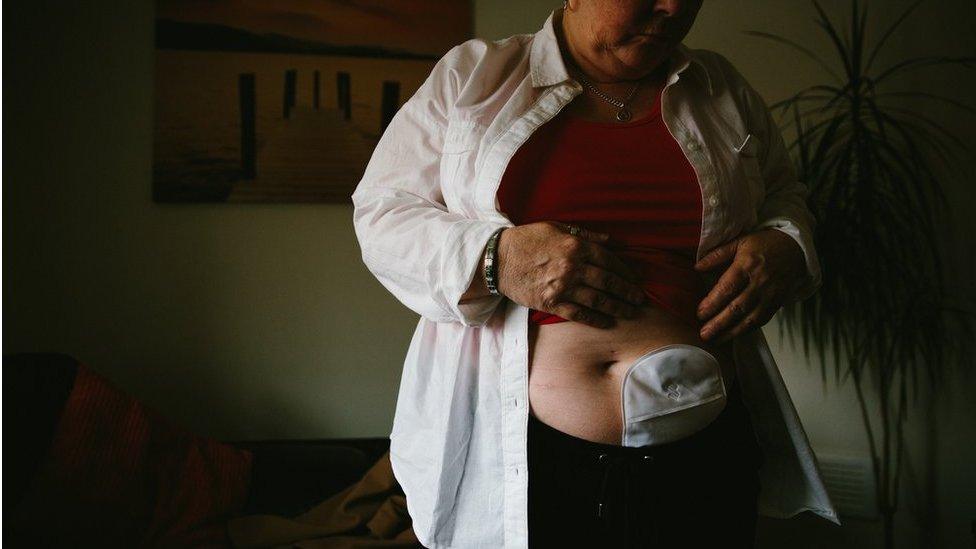Vaginal mesh: 'No-one believed my pain'
- Published
Yvonne McIntosh: "I have been in pain for so many years"
A woman who finally had pelvic mesh removed after several failed attempts has said the hardest part was feeling no-one believed her pain.
Yvonne McIntosh, 61, from County Antrim, told BBC News NI the mesh had turned her life upside down.
"I have been in pain for so many years with the mesh," she said. "It cut through from my thigh to my vagina."
"Both legs have burning sensations, not to mention the emotional side with my marriage."

A national campaign group was launched to raise awareness of the potential risks of the surgery
A review published on Wednesday , externalfound many lives had been ruined because officials failed to hear the concerns of women in relation to vaginal mesh and other procedures and drugs.
Ms McIntosh is one of many Northern Ireland women who have said they feel vindicated by the review.
Another, Jackie Harvey, told the BBC's Good Morning Ulster that the "most horrible thing" was not being believed about the pain they were going through.
The chairwoman of the highly critical review, Baroness Julia Cumberlege, said the families affected deserved a fulsome apology from the government.
Mesh implants have been used to treat conditions such as incontinence and prolapse in women, usually after childbirth.
Ms McIntosh had vaginal mesh inserted in 2013 to address incontinence. While it was a success at the beginning, she said she felt like the mesh was unravelling inside her body.
She was among a group of local women who, in 2017, told their stories to BBC News NI.
They went on to become part of a national campaign called Sling the Mesh.
In Northern Ireland, there are more than 500 members.
They took their case to Westminster and were interviewed as part of the Independent Medicines and Medical Devices Safety Review.
In a statement, Health Minister Robin Swann said: "While it is recognised that the review does not directly relate to Northern Ireland, the department will consider any recommendations arising in a local context to improve our handling of patient concerns surrounding the safety of medicines and medical devices.
"Patients from Northern Ireland were able to submit their evidence following our request to the secretary of state for health.
"I would like to thank those who inputted to this review, sharing their experience to help improve patient safety."

The mesh is made of polypropolene and surgeons routinely use it in hernia repair
Ms McIntosh said part of the problem was getting their condition recognised by some medical professionals.
She also said the mental scars were often as cutting as the physical ones.
"They didn't believe us. They didn't and that was the hard part," she said.
"I think you sort of felt a bit foolish, because they didn't believe you, and that was just - it wasn't easy to cope with.
"It makes me sad that it's taken so long to come to this. I think just - to know people believe us… believe me."
'Threatens my way of life'
She has recently moved to a bungalow as she finds climbing stairs difficult.
"At 61, I didn't think my life would be like this," she said.
"I can't walk far and I'm always experiencing some degree of pain. At night, I turn and sleep is disrupted."
Her mesh, which measured 13cm (5in) by 9cm (3in) when removed from each leg in March, had pushed its way through her vagina and under her buttock.
"Two previous operations failed and, at one point, they couldn't find it," she said.
"However a recent operation in March in Bristol by the health service located two long strips and they were removed. I was so happy they'd found them but then very sad too.
"The damage has been done and I am still in pain. I know my illness isn't life threatening but it threatens my life in a way that I was not expecting.
"I am burning and the anxiety that I have had over the last year from part of this journey, I've never had in my life before."
Indignity
Jackie Harvey had mesh implanted for a pelvic issue.
She had it for 12 years, but said the pain did not start until about six years after it was put in.

Jackie Harvey says she feels vindicated by the review
"It's just so sad that so many of us had to go to the likes of the media and the papers to actually be heard, instead of our doctors and consultants actually sitting down and putting all the dots together and realising that we have a problem here," she said.
"Maybe a hell of lot more women could have avoided being damaged over the past few years.
"But we are where we are and at least today I feel that all the women suffering have been vindicated."
Ms Harvey said since she had the mesh removed her health has improved, although she still has some pain and has to take medication.
"I feel like I was one of the lucky ones, I've kind of got used to my new normal and I just get on with my life now accepting what has happened - I can't change that," she said.
"I just feel that we don't want this to happen to any more people."
- Published8 July 2020

- Published16 November 2017

- Published5 April 2019

- Published10 January 2019
